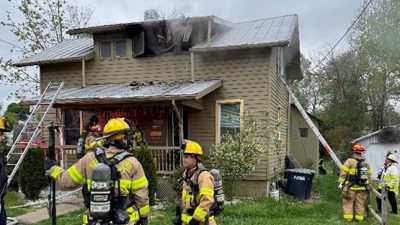
The mood among these 84 visitors from 35 nations seemed undampened either by chilly, wet weather or slightly reduced attendance as the 14th annual Summer Peacebuilding Institute opened May 4 at Eastern Mennonite University.
“As I look at your faces and listen to your voices, I feel the presence of the whole world here,” SPI’s new executive director Sue Williams told the gathering in Martin Chapel.
Learners at SPI – a program operated by EMU’s Center for Justice and Peacebuilding – work in humanitarian, conflict resolution and other peace-related areas in their home countries. Ninety-six had been expected for the opening session, but attendance has been deterred by visa restrictions combined with the global economic downturn and swine flu outbreak, Williams said.
Bukenya, attending for the first time, had learned of SPI through his service on a peacebuilding team in Kampala. His parishioners, having endured prolonged hardships in their country’s 23-year-long civil war, face challenges that he characterized in part as “trauma healing and forgiveness.” Hoping to gain theoretical knowledge to strengthen skills he has been acquiring by practice, Bukenya has enrolled in two classes: “Faith-Based Peacebuilding” and “Philosophy and Praxis of Forgiveness and Reconciliation.”
“I’m fighting for the rights of women in Pakistan,” said Razia Joseph, president of the Women Shelter Organization in Faisalabad, a city in her nation’s Punjab region. Her organization promotes women’s education and health care, assists women in prison and provides shelter for victims of domestic violence. In contacts with fellow-peacebuilders in SPI, she hopes to call attention to the plight of the women in her country.
More than 2,200 alumni from all parts of the world have attended SPI. During four sessions spread over six weeks, SPI learners form cross-cultural friendships and working partnerships while studying many aspects of solving conflict. New courses and instructors this year include “Faith-Based Peacebuilding,” offered by Roy Hange, co-pastor of Charlottesville Mennonite Church and Harrisonburg District overseer for the Virginia Mennonite Conference; and “Human Rights, Governance, and Peacebuilding,” taught by Dan Wessner, EMU professor of international and political studies. SPI training sessions will include mediation and facilitating crime victim/offender dialogue.
“The ideal global learning experience would be for each of us to spend a year working alongside every person here,” said Williams. Although that is not possible, she noted, “We have SPI.” Williams replaced former SPI director Pat Hostetter Martin following her retirement last year.
Before arriving on campus in Fall 2008, Williams had lived and worked in Northern Ireland, Uganda, Kenya and Botswana, and had served as a consultant on political mediation and dialogue in a training program for the Mediation Support Unit of the United Nation’s Department of Political Affairs.
“We are here to be learners and teachers. We are not here to have a vacation,” Williams noted. However, shared meals, sports, music and local sightseeing enrich the cultural learning.
The opening ceremony by CJP students featured symbols of diversity – small flags from many lands, colorful fabrics and religious symbols. A round loaf of bread served to symbolize unity. “If you are not familiar with the term, ‘potluck,’ you will be during your time at SPI,” an announcer promised.
Some SPI participants earn credit toward a masters’ from the CJP program, which has awarded degrees to about 300 graduates now working in more than 50 nations, said CJP executive director Lynn Roth.
A standby in SPI opening ceremonies is the introduction of each guest by home country. Nations represented this year included Jordan, Syria, Yemen, Egypt, Pakistan, Lebanon, Kenya, Palestine, Ethiopia, Cameroon, Sri Lanka, the Ukraine, the UK, Afghanistan, Northern Ireland, Denmark, Canada and Honduras.
Following prayers from several languages and faith traditions, the class work began.
The SPI program, with six intensive classes in each of the four sessions, will run through June 12.
– Chris Edwards is a freelance writer living in Harrisonburg.










